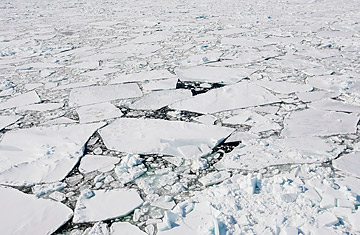
Ice floes are seen off the coast of Novia Scotia in Canada.
When scientists say the planet is warming, they usually point to rising air temperatures as proof. That's reasonable enough, especially since the warmth of the air temperature affects us directly so we feel the change the scientists are measuring. But it's also misleading: while the lower atmosphere has been gradually warming over the past 50 years, it happens unevenly, rising sharply for a year or two or even ten, then flattening out. That stutterstep pattern is due to relatively short-lived effects on top of the general warming — an El Nino current in the Pacific making things warmer, for example, or a volcanic eruption like 1991's Mt. Pinatubo producing a cloud of dust that makes things cooler. Over time, these cancel out, but it can be tempting — though incorrect — to think a temporary flattening means global warming has stopped.
To get a measure of what's truly going on, scientists look to the oceans — slow to heat up, slow to cool down, and thus less prone to short-term variations. Indeed, says John Lyman an oceanographer at the University of Hawaii, "about 80 or 90 percent of the extra heat absorbed by the planet is absorbed into the oceans." That being the case, Lyman and several colleagues set about trying to see how the ocean's heat content has changed over the past couple of decades. The result, appearing in the current issue of Nature, will give little comfort to climate change deniers: the oceans have been warming inexorably since at least 1993, at a rate broadly consistent with what you'd expect from the buildup of greenhouse gases.
There are some uncertainties in the numbers — not surprising, since the new study is essentially a synthesis of earlier papers, done by different groups using different instruments and making different sorts of measurements. "There's a large amount of error in the data," admits co-author Josh Willis, of NASA's Jet Propulsion Laboratory, in Pasadena. "But the signal of global warming is abut six times larger than any uncertainties." In particular, the so-called "global cooling" climate skeptics claim has been going on since 1998 doesn't show up. "If you look at our data since 1998," says Lyman, "it's warmed significantly."
The curve does flatten somewhat in 2003 — but that may have to do with things going on in the deep ocean. The sensors involved in the latest research go down only to about 2,300 ft., roughly half the average depth of the world's oceans. The upper and lower ocean exchange heat just as the ocean and atmosphere do, and nobody really knows what's happening near the bottom. Less than two months ago, in fact, Kevin Trenberth and John Fasullo, both climatologists at the National Center for Atmospheric Research, in Boulder, Colorado, published a paper in Nature suggesting that some of the extra heat trapped by greenhouse gases has gone missing — and that it might well be hiding in the deep oceans. Part of the problem, Trenberth suggested, was the same sort of incomplete measurements and inconsistencies in data processing Willis and Lyman describe in their own study.
Incomplete though the numbers are, however, the results seem reasonably robust — and they're corroborated by another, entirely different set of measurements. As the oceans warm, they expand; indeed, up to half of sea-level rise comes not from melting glaciers or disappearing ice caps, but from the physical expansion of seawater as it heats up. And like the ocean's heat content, the rise in sea level is gradual enough that over time, the year-to-year or even decade-long ups and downs disappear into a steady, long-term increase. "A century ago," says Willis, "sea level was rising at about one millimeter per year. Fifty years ago it was two. And now it's rising at three millimeters per year."
In short, the oceans are currently doing the heavy lifting in absorbing trapped heat. Ultimately, though, some of that heat will be transferred back to the air, continuing to warm the places we live even if we manage to stop generating greenhouse gases at such a great rate. That makes it crucial to understand exactly what's going on offshore. If scientists can refine their measurements, writes Trenberth in a commentary on this week's Nature paper, "ocean heat content is likely to become a key indicator of climate change." That key, in turn, may be one more tool to help slow the damage.
Lemonick is the senior science writer at Climate Central.
